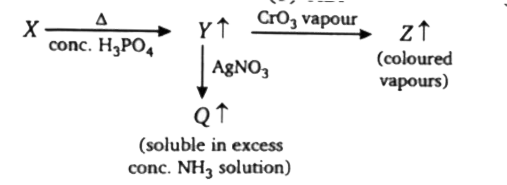Complete Solutions to ONE OR MORE ANSWERS IS/ARE CORRECT of chapter TYPES OF REACTIONS of Class 12 book with complete answers and questions
| Class 12 | CHEMISTRY |
| Chapter | TYPES OF REACTIONS |
| VK JAISWAL | ONE OR MORE ANSWERS IS/ARE CORRECT |
| Number Of Questions | 40 |
| Academic Year | 2023-24 |
Which of the following combination of species can evolve `O_(2)`?
03:09View Solution`SO_(2)(g)+Cl_(2)(g) to X overset(P_(4)) to Y+Z`
then X, Y and Z can be :01:55View SolutionWhich of the following nitrate salt solution neither produce ppt. with excess NaOH nor with excess `NH_(4)OH` solution?
03:19View SolutionWhich of the following compound(s) give two acids on dissolution in `H_(2)O`?
01:44View Solution`Xe+F_(2) overset(1:20) to X overset(H_(2)O) to Y overset(H_(2)O ) to Z overset(H_(2)O) to XeO_(3)`
Select correct option(s) for X, Y, Z and given chemical change:10:29View SolutionWhich of the following sulphide(s) does/do not liberate `H_(2)S` on warming with dil. HCl?
02:25View Solution`I_(2)+Na_(2)CO_(3)` "soln." `overset(Hot)toX+Y`
If 'X' gives coloured ppt. with `Pb(CH_(3)COO)_(2)` solution, then 'Y' will respond to which of the following ?06:28View Solution
Incorrect statement about 'R' isView Solution`NO_(2)` gas evolves on thermal decomposition of which of the following compound(s)?
02:15View SolutionWhich of the following precipitate(s) is/are dissolved to colourless solution on adding sufficient amount of dilute HCl?
01:14View SolutionWhich of the following combination of reagent(s) produce observable change in aqueous medium?
01:23View SolutionWhich of the following species is/are not liberating oxygen gas on reaction with water at `25^(@)C`?
02:02View SolutionHydrogen gas is not evolved by:
02:14View SolutionWhich of the following metal sulphide does not undergo hydrolysis?
01:37View SolutionWhich of the following gas is not dried by conc. `H_(2)SO_(4)` ?
02:04View Solution
Which of the following anion cannot be in X?View SolutionWhen ozone reacts with an excess of potassium iodide solution buffered with a borate buffer (pH 9.2) iodine is liberated which can be titrated against a standard solution of sodium thiosulphate, this is a quantitative method for estimating `O_(3)` gas. when liberated `I_(2)` and sodium thiosulphate will react, then product is/are:
02:30View SolutionIn which of the following reactions `NH_(3)` gas evolution occurs?
02:58View SolutionWhich of the following compound() during heating undergo redox decomposition reaction?
06:38View SolutionWhich of the following combination of species undergo(es) comproportionation?
02:39View SolutionWhich of the following combination of species can evolve `O_(2)`?
03:09View Solution`SO_(2)(g)+Cl_(2)(g) to X overset(P_(4)) to Y+Z`
then X, Y and Z can be :01:55View SolutionWhich of the following nitrate salt solution neither produce ppt. with excess NaOH nor with excess `NH_(4)OH` solution?
03:19View SolutionWhich of the following compound(s) give two acids on dissolution in `H_(2)O`?
01:44View Solution`Xe+F_(2) overset(1:20) to X overset(H_(2)O) to Y overset(H_(2)O ) to Z overset(H_(2)O) to XeO_(3)`
Select correct option(s) for X, Y, Z and given chemical change:10:29View SolutionWhich of the following sulphide(s) does/do not liberate `H_(2)S` on warming with dil. HCl?
02:25View Solution`I_(2)+Na_(2)CO_(3)` "soln." `overset(Hot)toX+Y`
If 'X' gives coloured ppt. with `Pb(CH_(3)COO)_(2)` solution, then 'Y' will respond to which of the following ?06:28View Solution
Incorrect statement about 'R' isView Solution`NO_(2)` gas evolves on thermal decomposition of which of the following compound(s)?
02:15View SolutionWhich of the following precipitate(s) is/are dissolved to colourless solution on adding sufficient amount of dilute HCl?
01:14View SolutionWhich of the following combination of reagent(s) produce observable change in aqueous medium?
01:23View SolutionWhich of the following species is/are not liberating oxygen gas on reaction with water at `25^(@)C`?
02:02View SolutionHydrogen gas is not evolved by:
02:14View SolutionWhich of the following metal sulphide does not undergo hydrolysis?
01:37View SolutionWhich of the following gas is not dried by conc. `H_(2)SO_(4)` ?
02:04View Solution
Which of the following anion cannot be in X?View SolutionWhen ozone reacts with an excess of potassium iodide solution buffered with a borate buffer (pH 9.2) iodine is liberated which can be titrated against a standard solution of sodium thiosulphate, this is a quantitative method for estimating `O_(3)` gas. when liberated `I_(2)` and sodium thiosulphate will react, then product is/are:
02:30View SolutionIn which of the following reactions `NH_(3)` gas evolution occurs?
02:58View SolutionWhich of the following compound() during heating undergo redox decomposition reaction?
06:38View SolutionWhich of the following combination of species undergo(es) comproportionation?
View Solution
ONE OR MORE ANSWERS IS/ARE CORRECT questions and complete solutions for chapter TYPES OF REACTIONS of VK JAISWAL CHEMISTRY (HINGLISH) of Class 12
